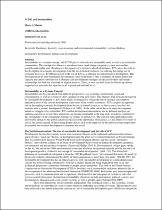JavaScript is disabled for your browser. Some features of this site may not work without it.
- ResearchSpace
- →
- Research Publications/Outputs
- →
- Book Chapters
- →
- View Item
| dc.contributor.author |
Marais, Mario A

|
|
| dc.date.accessioned | 2015-08-19T11:10:59Z | |
| dc.date.available | 2015-08-19T11:10:59Z | |
| dc.date.issued | 2015-02 | |
| dc.identifier.citation | Marais, MA. 2015. ICT4D and Sustainability. In: International Encyclopedia of Digital Communication and Society. Wiley, Chichester, West Sussex | en_US |
| dc.identifier.isbn | 978-1-118-29074-3 | |
| dc.identifier.uri | https://books.google.co.za/books?id=SVmsCQAAQBAJ&pg=PR27&dq=The+International+Encyclopedia+of+Digital+Communication+and+Society&hl=en&sa=X&ved=0CBsQ6AEwAGoVChMI7qHb1N3hxgIVyO0UCh3GEAC8#v=onepage&q=The%20International%20Encyclopedia%20of%20Digital%20Communication%20and%20Society&f=false | |
| dc.identifier.uri | http://hdl.handle.net/10204/8092 | |
| dc.description | Copyright: Wiley, Chichester, West Sussex | en_US |
| dc.description.abstract | Sustainability is a systems concept, and ICT4D plays a vital role in a sustainable earth, as well as in sustainable communities. The concept of resilience is introduced since rapid change can push a system into another, possibly undesirable state. Resilience is the capacity of a system to absorb disturbance. ICTs play a key role in the decoupling of economic development from the use of natural resources, by reducing the energy use of economic processes. ICT4D has moved to the use of ICTs as a platform for transformative development. This development must start with human development, since technology is only a multiplier of human intent and capacity and cannot substitute for it. Human scale development strategies are discussed where self-reliant relationships are built via a network of aligned interests. These, in turn, are built from the bottom up and are supported via networks that span the local, regional and national levels. | en_US |
| dc.language.iso | en | en_US |
| dc.publisher | Wiley | en_US |
| dc.relation.ispartofseries | Workflow;14980 | |
| dc.subject | Resilience | en_US |
| dc.subject | Diversity | en_US |
| dc.subject | Socio-economic and environmental sustainability | en_US |
| dc.subject | Systems thinking | en_US |
| dc.subject | Participative development | en_US |
| dc.subject | Human scale development | en_US |
| dc.title | ICT4D and sustainability | en_US |
| dc.type | Book Chapter | en_US |
| dc.identifier.apacitation | Marais, M. A. (2015). ICT4D and sustainability., <i>Workflow;14980</i> Wiley. http://hdl.handle.net/10204/8092 | en_ZA |
| dc.identifier.chicagocitation | Marais, Mario A. "ICT4D and sustainability" In <i>WORKFLOW;14980</i>, n.p.: Wiley. 2015. http://hdl.handle.net/10204/8092. | en_ZA |
| dc.identifier.vancouvercitation | Marais MA. ICT4D and sustainability.. Workflow;14980. [place unknown]: Wiley; 2015. [cited yyyy month dd]. http://hdl.handle.net/10204/8092. | en_ZA |
| dc.identifier.ris | TY - Book Chapter AU - Marais, Mario A AB - Sustainability is a systems concept, and ICT4D plays a vital role in a sustainable earth, as well as in sustainable communities. The concept of resilience is introduced since rapid change can push a system into another, possibly undesirable state. Resilience is the capacity of a system to absorb disturbance. ICTs play a key role in the decoupling of economic development from the use of natural resources, by reducing the energy use of economic processes. ICT4D has moved to the use of ICTs as a platform for transformative development. This development must start with human development, since technology is only a multiplier of human intent and capacity and cannot substitute for it. Human scale development strategies are discussed where self-reliant relationships are built via a network of aligned interests. These, in turn, are built from the bottom up and are supported via networks that span the local, regional and national levels. DA - 2015-02 DB - ResearchSpace DP - CSIR KW - Resilience KW - Diversity KW - Socio-economic and environmental sustainability KW - Systems thinking KW - Participative development KW - Human scale development LK - https://researchspace.csir.co.za PY - 2015 SM - 978-1-118-29074-3 T1 - ICT4D and sustainability TI - ICT4D and sustainability UR - http://hdl.handle.net/10204/8092 ER - | en_ZA |






